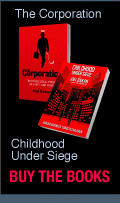TheCorporation.com Blog
| All Blogs |
Student group in Vancouver Raises the Alarm Over Extractive Industries on Campus
By Katherine DoddsGuest Blog by Sam Stime, Calling on Corporation Blog readers to sign our petition!
 For a year, students at UBC and SFU have been raising the alarm bells about the federally-funded and mandated Canadian International Institute for the Extractive Industries and Development, the CIIEID, now housed at our universities. After extensive due-diligence, we’ve rolled out a petition calling on the decision-makers at our universities to review the poorly informed decision to host the extractive industry think-tank, and to take the precedent-setting step of dismantling it.
For a year, students at UBC and SFU have been raising the alarm bells about the federally-funded and mandated Canadian International Institute for the Extractive Industries and Development, the CIIEID, now housed at our universities. After extensive due-diligence, we’ve rolled out a petition calling on the decision-makers at our universities to review the poorly informed decision to host the extractive industry think-tank, and to take the precedent-setting step of dismantling it.
The petition is available here. The students’ blog StopTheInstitute.ca provides extensive background to problems around Big Mining, Canadian diplomatic support for Canadian extractive companies overseas, and a narrative of the students’ rigorous search for information from the completely opaque CIIEID. The petition is getting attention from citizens, NGOs, and academics across Canada, who recognize this institute as a threat to academic freedom & integrity, as corporatization of the universities in its most heinous form, as an academic cloak concealing a predatory industry, and as a menace to the well-being of communities and to the local decision making processes of sovereign nations. To date, hundreds of stakeholders have signed on to the petition, including dozens of faculty at the coalition universities.
In stating what is expected of the university, the student blog doesn’t beat around the bush. Cards promoting the line-in-the-sand petition don’t either. Text accompanying an image of a gaudy masquerade mask reads, “Cute mask. But claiming to ‘alleviate poverty’ by promoting Canadian mining overseas isn’t fooling anyone.’ It goes on to assert, “This new mining institute is a threat to academic independence, and a threat to many countries’ own resource governance decisions. It’s way too problematic to host at our universities. Together, we’re asking the highest authorities at UBC, SFU, and EPDM to close it. Please sign the petition today.”
With the atrophy observed among directors, managers, and other key staff (all mention of them having been removed from the CIIEID ‘people’ page in the last months), students are now confident that the charade is nearly over.
The petition has stimulated a critical examination of whether it’s really appropriate for such a mining institute to be hosted at our universities. It’s urged self-reflection on Canadian complicity in abuses and exploitation outside Canada’s borders, and challenged our own assumptions about our right to acquire others’ resources, even at the cost of their own sovereign decision-making.
Some have cautioned us, “Demanding to close the institute is taking a pretty hard line. Have you offered constructive suggestions for how the institute could be done right? Twenty-five million dollars could do a lot of good.”
Well, if the mandate of a $25 million-funded institute were truly emancipatory, limiting its research and projects to those with a preferential option for the historically marginalized, then it could do a lot of good.
And if it were limited to addressing the structural sources of problems in the “developing countries’ own extractive sectors” by providing policy suggestions to Canadian lawmakers on how to hold accountable in our own courts the predatory behavior of companies based here but operating abroad, then it could do some good.
And if the institute were free of cash or in-kind aid from the extractive sector, in fact free of all personnel links with the extractive sector, then it could possibly do some good. (The returned records from a recent FOI request for ‘letters of support’ from the CIIEID’s strategic partners are available for download from this link; surely an introduction to the litany of allegations of human rights abuses by partner Goldcorp isn’t necessary here.)
And if the great majority of influential positions among its Executive Board and Advisory Committee, and internal management, director, and advisory positions were held by members of mining affected communities and solidarity organizations that are critical of the Canadian extractive industries’ status quo, then the CIIEID may be able to do some good.
And finally, if mechanisms were in place to ensure such an institute is actually free to publish any and all findings at the discretion of individual researchers, whether or not critical of the industry or its political proponents, and all contribution agreements conformed to the rigorous guidelines set out by the CAUT, then the institute could be a benefit to the universities and the public good.
Students have repeatedly made these suggestions, in personal letters to those directing the CIIEID, to UBC’s (at the time) president Stephen Toope, and publicly on the blog. University authorities have had the opportunity to bear witness to the concerns and to the constructive suggestions made.
But no good-faith response has yet been made to the substantive concerns or to these suggestions, let alone to the straightforward information requests made over the last year. That those leading this university-based institute have stonewalled the well-supported student position lends further legitimacy to the emerging determination that this is little more than a thinly-veiled lobby group for Big Mining, rather than a well-considered and robustly-defended academic body. The suggestions made above have not and will not be considered or implemented in good faith.
So we’re no longer requesting the universities to oversee tweaks to a deeply-flawed extractive industries institute, but to take the precedent-setting step for the good of our universities and in defense of historically exploited peoples, to outright close the CIIEID and return the promised funds to DFATD and strategic partners. Backtracking like this may be a reputational embarrassment to the universities, but even as a strategic financial decision, may garner the respect of alumni and other donors rather than chase them away through this shameful initiative that draws only public ire.
We want to encourage readers of The Corporation blog to add the weight of your names to the many who have already signed on to the petition. Together we’re informing the universities’ executives that we support a courageous move to re-think a misinformed past decision and to close this unhealthy appendage to the universities they love and direct.
Tag(s): Mining, The Corporation
|
Comments(2)
On September 30, 2014 at 12:37 PM greg wrote:is signing this petition only limited to Canadian citizens?
On October 01, 2014 at 07:53 AM kat wrote:
No, this isn't just limited to Canadian citizens. We're encouraging anyone who considers themselves a stakeholder in the implications of the CIIEID to join us in this petition. Visiting professors and international students at Canadian universities, and everyone at other universities identified as 'strategic partners' certainly are stakeholders, as are folks from countries of interest to Canadian diplomacy and the extractive industries. Thank-you for your interest and support in this! ~ Sam Stime













